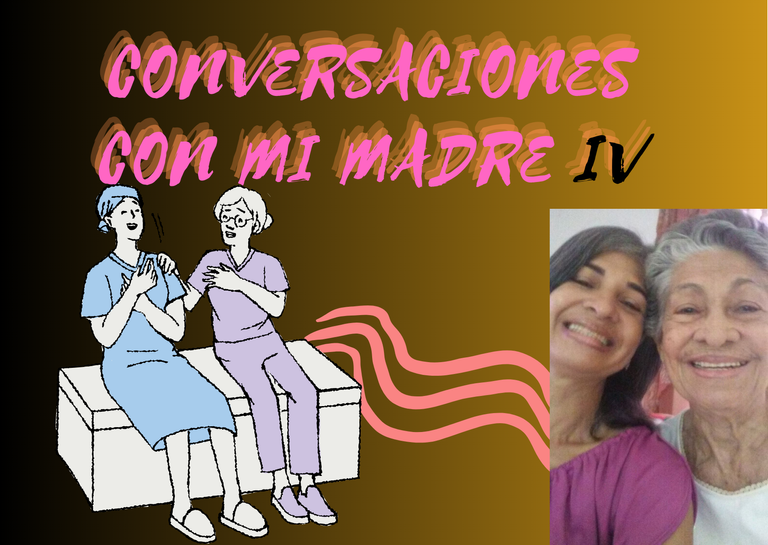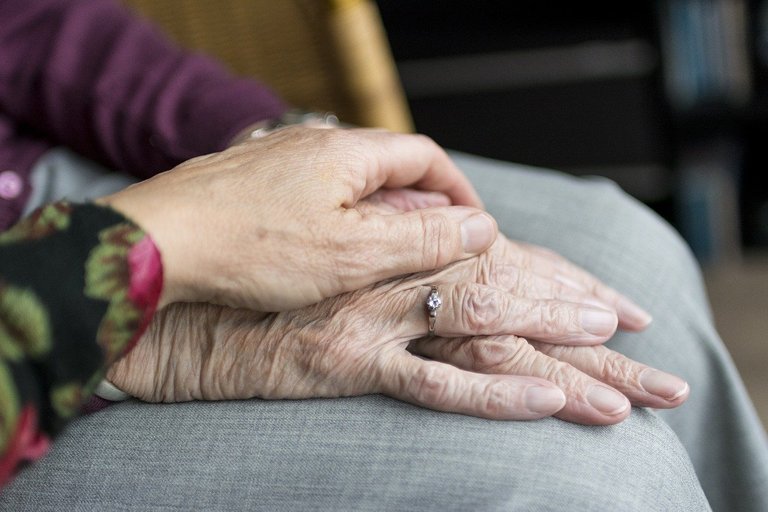Conversaciones con mi madre(IV) [Esp/Eng]

Imagen de portada editada en Canva con sus recursos.Fotografìa propiedad de la autora. Abril 2024.

Esta serie que comencé hace unos meses creí que solo llegaba hasta allí. Me encuentro en la situación que puedo seguir, hay material para plasmar las vivencias recordadas por ella, continuar contando, dejando testimonios de esas historias de mi madre que le llegan como ráfagas de luz a su mente y me dice: no te acuestes todavía, que todavía tengo que contarte algo. Así, sigo escuchando y dejando sus huellas en estos post, que reunirlos pienso que es una bendición de poder hacerlo; quedando plasmados y la emoción de ella cuando se los leo, veo en su rostro satisfacción porque lo que cuenta queda para recordarla.
Ya casi para ir a dormir, le digo : mamá bendición...vamos a descansar. Me responde: siéntate aquí que te voy a contar algo.
Cuando era niña, dice ella que tenía como siete años, su madre y su abuela llamaban a una chica de nombre Gregoria que vivía cerca (como me dice ella, no tan cerca, pero para nosotros era cerca) la función de esta ayuda era que se quedara con los niños mientras ellas estuvieran ausentes. La razón de su ausencia es que se iban a la siembra de arroz a rescatar la cosecha , porque el río estaba crecido y por la acción del agua se doblaban las espigas(llamadas maracas de arroz) y el arroz se dañaba. Entraban al río y el agua les llegaba a la altura de la cintura, cortaban y llevaban a la parte seca para que el arroz se secara con el sol.
Mientras, la madre y la abuela realizaban este trabajo para asegurar el alimento, la chica atendía a los niños de comida, organizaban el rancho como dice ella, se iban al río a bañarse y lavar la ropa que llevaban, se secaba la ropa y volvían a casa.

Fuente


Fuente

Cuando regresaban las señoras en la tarde bien agotadas comían lo que les guardaban sin decir nada, sin importan como estuviera esa comida.
Cuando la chica no los acompañaba(Gregoria), ella(mi madre) con su corta edad le tocaba encargarse de sus hermanos, cocinar y lo que pudiera hacer como lo hiciera.
Me contó que un día de esos montada en un tolete para alcanzar el fogón hizo un arroz, tomó onoto recién agarrado de la mata, ella dice que el onoto no tenía buen olor lo echó en agua y desprendió tanto el olor como el color bastante fuerte. Sus hermanitos así lo comieron.
Cuando llegaron las señoras, mi madre les pregunta si quieren comer. La abuela le dice: ¿cocinaste mijita? ¿y qué hiciste? ella, muy contenta (imagino su cara de orgullo porque les guardó comida) les dice arroz con onoto. La abuela sonrió y se comió esa comida. Mi madre me dice que tanta hambre traían que lo comieron sin decir nada...y no dejaron nada.
Otro cuento era que otros días con uno de sus hermanos, pequeño como ella trataron de hacer harina de maíz. Ella tostó el maíz, no uso la piedra de moler porque no aprendió a usarla y de paso que era una niña, decidieron pilar el maíz (usar el pilón) ...ella dice que lo que pilaban lo sacaban con la mano para seguir con el resto, claro no quedaba bien fino. Quedaba en trocitos. Le ponían un poco de sal y así lo comían. Se ríe y me dice: masticábamos el maíz.

Fuente


Fuente

Al llegar las señoras ella les ofrece y la abuela se ríe, igual se comían todo así no haya quedado bien pilado.
Una niña de 7 años al cuidado de sus 4 hermanos y dos primos con tanta responsabilidad en esos tiempos. Cuanta inocencia, responsabilidad y lealtad hacia sus progenitoras: madre y abuela.



Divisores Fuente

ENGLISH
english version (click here) This series that I started a few months ago I thought I was only going to get there. I find myself in a situation where I can continue the series, continue telling, leaving testimonies of those stories of my mother that come to her like bursts of light to her mind and she tells me: don't go to bed yet, I still have to tell you something. So, I continue listening and leaving her traces in these posts, which I think is a blessing to be able to gather them together; being able to capture them and her emotion when I read them to her, I see in her face satisfaction because what she tells remains to remember her.
Almost ready to go to sleep, I tell her: Mother blessing...let's go to rest. She answers me: sit down here, I am going to tell you something.
When she was a child, she says she was about seven years old, her mother and grandmother called a girl named Gregoria who lived nearby (as she tells me, not so close, but for us it was close) the function of this help was to stay with the children while they were absent. The reason for their absence was that they were going to the rice fields to rescue the harvest because the river was swollen and the water bent the ears of rice (called maracas de arroz) and the rice was damaged. They entered the river and the water reached waist height, they cut and took them to the dry part so that the rice would dry in the sun.
While the mother and grandmother did this work to ensure food, the girl took care of the food children, organized the ranch as she says, went to the river to bathe and wash the clothes they wore, dried the clothes, and returned home.
When the ladies returned in the afternoon, exhausted, they would eat what was saved for them without saying anything, no matter how the food was.
When the girl did not accompany them (Gregoria), she (my mother) at a young age was in charge of her brothers, cooking, and whatever she could do as she did.
She told me that one of those days, she was riding on a pole to reach the stove and she made rice, she took onoto freshly picked from the bush, and she said that the onoto did not smell good, so she threw it in water and it gave off both the smell and the color quite strong. Her siblings ate it like that.
When the ladies arrived, my mother asked them if they wanted to eat. The grandmother said: "Did you cook mijita? and what did you do? She was very happy (I imagine her proud face because she saved food for them) and told them rice with onoto. Grandma smiled and ate that food. My mother tells me that they were so hungry that they ate it without saying anything...and left nothing behind.
Another story was that other days with one of her brothers, small like her, they tried to make corn flour. She toasted the corn, she didn't use the grinding stone because she didn't learn how to use it, and because she was a little girl, they decided to grind the corn (use the pestle) ...she says that what they ground them took it out with their hands to continue with the rest, of course it wasn't fine. It was left in small pieces. They put a little salt on it and ate it that way. She laughs and tells me: that we chewed the corn.
When the ladies arrived, she offered it to them and the grandmother laughed, but they still ate it all, even if it wasn't well-ground.
A 7-year-old girl taking care of her 4 brothers and two cousins with so much responsibility in those times. How much innocence, responsibility, and loyalty to her parents: mother, and grandmother.
Translated with DeepL.com (free version)
0
0
0.000
0 comments